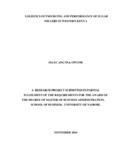| dc.description.abstract | In the wake of global economy, market conditions have shifted, business strategies have evolved, new technologies have emerged, customers have become knowledgeable and demand higher quality, low cost and better services. This has borne the problem of profitability and turbulent competitive environment. Organizations must look for opportunities to remain competitive by being proactive, innovative and agile to meet customers’ demands and choices. The competition is on the basis of competent capabilities and production strategies which lead to quality, efficiency and flexibility (Momme, 2002). Organizations pursue tailored products and services, flexibility and scale economies by reinventing the wheel of the design and production activities (Suri, 2008). Many establish strategic decisions to focus on their core competencies in order to identify processes that are critical to make outsourcing decisions (Scrobatic et al, 2012). Organizations contract out production of goods and services to the third party service providers as they concentrate on core business activities while non- core activities which are generally expensive are outsourced. The sugar millers outsource logistics to increase their performance level, hence improved their productivities, competitiveness and profitability, minimize costs, increased customer satisfaction. The studies done so far have not been carried on logistics outsourcing with respect to performance of sugar millers in Western Kenya. The objectives of the study was to establish the impact of Logistics outsourcing on performance of sugar millers and also to determine the challenges faced in outsourcing logistics by the sugar millers in Western Kenya. Longitudinal study and census survey were both used to capture relevant information for the study in the nine sugar millers. The study used both primary and secondary data gathered by the researcher through open ended questionnaires and data collection forms respectively. These instruments were administered through drop and pick to the finance managers / accountants or equivalents. The population was 9 sugar millers in Western Kenya and response rate was 88.9%. The data was analyzed using descriptive statistics, with the tools being mean, frequencies, standard deviation, cross tabulation and time series regression analysis by making use of statistical package for social sciences, stata and excel spreadsheet. The study found out that the sugar millers outsourced transportation, maintenance and repairs, cane harvesting, security and legal services. These resulted in customer satisfaction, increased productivity, timely delivery, costs minimization and improved profits. | en_US |



